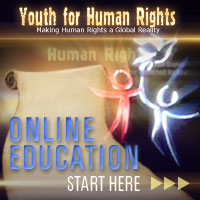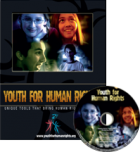Committee on the Rights of the Child Sees Human Rights Education As a Top Priority
With an estimated 1.2 million children trafficked each year for exploitative labor or sex slavery, over 300,000 child soldiers—some as young as 8, and 115 million primary school-aged children denied any formal education whatsoever, the international community needs to become far more effective in ensuring the basic human rights to which children are entitled. Recognizing this need, the United Nations adopted the Convention on the Rights of the Child in November 1989, and in 1991 set up the Committee on the Rights of the Child under the United Nations Commission on Human Rights, in Geneva, to monitor the implementation of the convention.
To give children themselves a voice in their own future, this year the Committee decided to devote its annual “Day of General Discussion,” on the 15th of September, 2006, to the subject “Speak, Participate and Decide—The Child’s Right to Be Heard,” where thirty-three children and teenagers were invited to attend.
And so it was that Angelo Kreuzberger, representing the Austrian chapter of Youth for Human Rights International, arrived at the Palais Wilson, seat of the UN High Commissioner on Human Rights, in Geneva.
He made his presentation to 200 Committee members, NGO (nongovernmental organization) representatives and the other youth who participated in the program.
Angelo’s message was a simple one—if we are serious about empowering children with their rights, the first step has to be education, as no one can really have what he or she doesn’t understand.
Since its inception in 2001, Youth for Human Rights International has worked to implement universal human rights education for youth around the world, inspired by the statement by L. Ron Hubbard: “Human rights must be made a fact, not an idealistic dream.” And to make this possible, they have developed teaching materials that help young people understand their rights and responsibilities.
As part of this program, this year Youth for Human Rights International created thirty short films in coordination with the Human Rights Department of the Church of Scientology International. Each film is under a minute long, and each illustrates one of the 30 Articles of the Universal Declaration of Human Rights.
The highlight of Angelo’s speech was his presentation of several of these films, which were created as public service announcements to be aired on television stations.
But as much as Angelo is convinced of the value of these PSAs, which have been made available in 17 languages, he was surprised and delighted with how well they were received by the attendees.
After his speech, not only was he approached by numerous country delegates, youth organizations and NGOs who want to use these films in their own programs, but at the end of the annual “Day of General Discussion” the rapporteurs (those designated to report on the findings of the commission) listed human rights education as their top priority.
For more information on Youth for Human Rights International and their educational materials, or to view the human rights PSAs online, visit www.youthforhumanrights.org.
Youth for Human Rights International and the Human Rights Department of the Church of Scientology International have produced 30 public service announcements (PSAs) in 17 languages to educate people of all ages on their human rights and responsibilities. Click here to view the PSAs.


